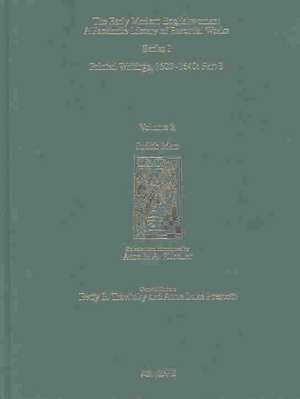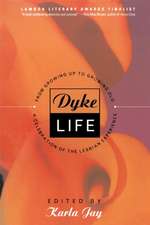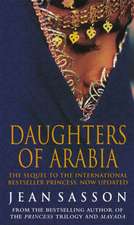Judith Man: Printed Writings 1500–1640: Series I, Part Three, Volume 2: The Early Modern Englishwoman: A Facsimile Library of Essential Works & Printed Writings, 1500-1640: Series I, Part Three
Autor Amelia A. Zurcheren Limba Engleză Hardback – 28 apr 2003
Preț: 708.55 lei
Preț vechi: 989.74 lei
-28% Nou
Puncte Express: 1063
Preț estimativ în valută:
135.58€ • 147.74$ • 114.25£
135.58€ • 147.74$ • 114.25£
Carte tipărită la comandă
Livrare economică 23 aprilie-07 mai
Preluare comenzi: 021 569.72.76
Specificații
ISBN-13: 9780754604419
ISBN-10: 0754604411
Pagini: 176
Dimensiuni: 189 x 246 mm
Greutate: 0.45 kg
Ediția:1
Editura: Taylor & Francis
Colecția Routledge
Seria The Early Modern Englishwoman: A Facsimile Library of Essential Works & Printed Writings, 1500-1640: Series I, Part Three
Locul publicării:Oxford, United Kingdom
ISBN-10: 0754604411
Pagini: 176
Dimensiuni: 189 x 246 mm
Greutate: 0.45 kg
Ediția:1
Editura: Taylor & Francis
Colecția Routledge
Seria The Early Modern Englishwoman: A Facsimile Library of Essential Works & Printed Writings, 1500-1640: Series I, Part Three
Locul publicării:Oxford, United Kingdom
Cuprins
Contents: Introductory note; Judith Man, tr. Epitome of the History of Faire Argenis and Polyarchus (1640); Appendix A: John Barclay, from Liber V of Ioannis Barclaii Argenis, 2nd edition (1622); Appendix B: Nicolas Coeffeteau, tr. pp. 152-174 (204) from Histoire de Poliarque et d'Argenis (1624); Appendix C: Kingsmill Long, tr. Book 5, Chaps, 18-20 from Barclay his Argenis, 2nd edition (1636).
Descriere
An Epitome of the History of Faire Argenis and Polyarchus is Judith Man's English translation of a 1623 French work by Nicolas Coeffeteau, Histoire de Poliarque et d'Argenis, which is itself an abridgement and translation of one of the most widely read fictional works of the seventeenth century, John Barclay's 1621 Latin romance Argenis. An extended political allegory of the rise to power of the French king Henri IV, Barclay's romance is peppered with numerous veiled anecdotes of politics at the English and other European courts and long disquisitions on statecraft and political ethics. It has been assumed that Barclay's work was strictly for a male audience, but Man's translation is evidence that women did in fact read Argenis, and might even suggest that allegorical romance offered women writers and readers an inroad into political discourse.

















